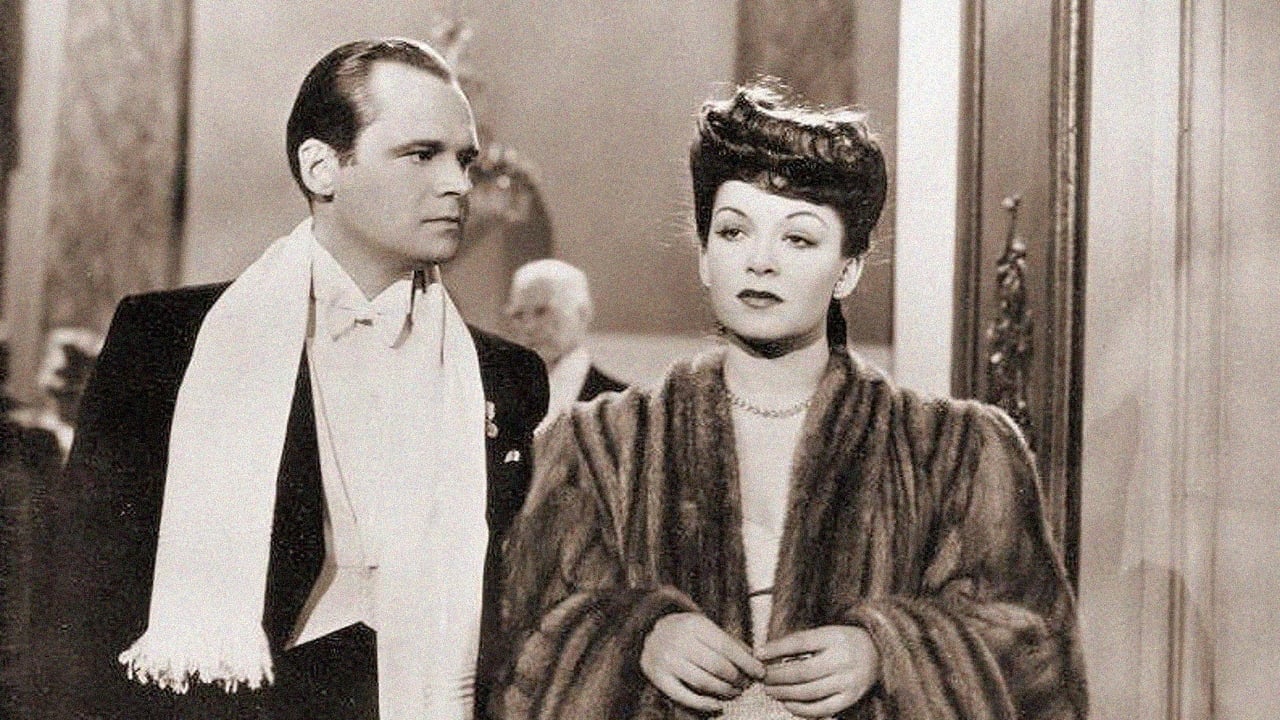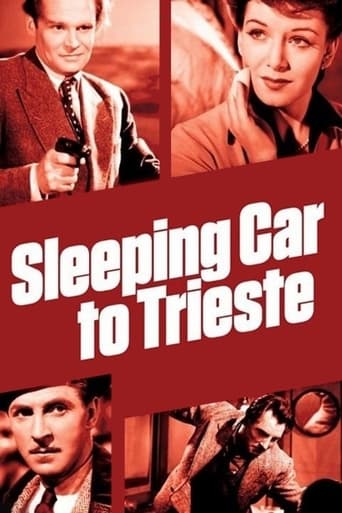




Slow pace in the most part of the movie.
Nice effects though.
Brilliant and touching
One of the best movies of the year! Incredible from the beginning to the end.
View MoreThe theft of a lethal diary which could create scandal and possible war leads to intrigue amongst the rather shady passengers on the Orient Express they are all traveling upon. This isn't a collection of nice people, as the thief killed a valet during the theft, another government agent is determined to get his hands on it, and other assorted amoral people become involved through their own schemes and the close proximity to the people after the hidden diary, which results in murder. The poor American soldier on leave gets taken in by a French girl wanting to avoid customs charges, and after having been bored by the British expert on birds, you can see why he was taken in so easily. Another passenger is an obvious ruthless businessman whose assistant briefly gets his hands on the diary with nefarious plans of his own.This remake of a classic (and rare) earlier British film ("Rome Express") is updated neatly to Post War Europe and features a cast of mostly obscure British actors amongst its large ensemble. Most familiar to American audiences is future Disney star David Tomlinson during his years as a character actor in both comedic and dramatic roles. Excellent photography aids in the tension of the film which builds to a frightening climax.
View MoreAlbert Lieven (Zurta) and Jean Kent (Valya) pursue Alan Wheatley (Karl) aboard the Orient Express. The object of their attention is a diary which Lieven must recover and leave the train with before he reaches Trieste.The film needed to go in either the comedy direction or the thriller direction. As it goes, it combines both which is frustrating. The final moments on the train are quite shocking given the rather lame humour which we have been fed during the previous hour and forty minutes. The ending seems out of place in this otherwise frothy adventure.Most of the actors are irritating. They play comedy roles that never make you laugh, except once – lawyer Derek De Marney (George) comes out with a classic laugh-out-loud moment when he presents his 3 theories of how someone has ended up dead to policeman Paul Dupuis (Inspector Jolif). It's the best moment of the film and we re-winded it twice! The best in the cast are Lieven and Kent, who play it straight and provide the thriller part to the film – the reason to watch it. Some characters are actually completely superfluous to the story – the bird watcher, the GI, the French cook and the British cook. There are too many characters providing comedy parts.As a whole, you watch to see what happens but it gets boring and the Brits speak in that ridiculous posh way that makes you cringe, and it basically helps to portray them as twerps. Not what is required for a good thriller.
View MoreAs an American, I am always interested to see how Americans are portrayed in European films, particularly films made prior to WWII and in the years immediately following it.The American in this film is portrayed as a vulgar contrast to the more sophisticated Europeans on board the train. He is a boozing, whistling, skirt-chasing Italian-American GI with a New York accent. (Why are they always from New York?) He is contrasted with the British passengers in two notable ways: First, his passion for the fairer sex is more overt and he comes across as wolfish in his pursuit of the young women in the film. This is contrasted with the discrete way in which the adulterous British couple on board the train are conducting their affair. When the two young French woman spurn his attempts to have a drinking party with them in their sleeping compartment, one says to him "We no longer wish to be liberated!" or words to that effect. This is a revealing statement about how the American military presence in postwar Europe was wearing thin the patience of Europeans.Second, the magazines this American GI reads are prominently displayed so as to ensure that the audience can see them. They are the standard popular American mediocrities of the day: Saturday Evening Post, Life Magazine, etc. This is contrasted with the more scholarly (albeit boring) readings of bird-watching Britisher sharing his compartment.Overall, the American in this film is the stereotypical boorish American so common in European films of this era. His portrayal, however, is not worse than Hollywood's stereotypes of Europeans.Please note that this is not a criticism, but rather an observation. Americans are not singled out for criticism; the film traffics in several stereotypes (the cheapness of Scotchmen, for example) and does so mainly in a vein of comedic irony. Even the British get their own send-ups in this film.
View MoreThere is something about trains as a setting for crime, espionage, and mystery. Agatha Christie used it in several of her stories, the most notable being turned into the film "Murder On The Orient Express". Other choice examples include Hitchcock's "The Lady Vanishes", Carol Reed's "Night Train To Munich", "The Great Train Robbery" (with Sean Connery), and "Break Heart Pass". The historical settings of some of these stories dim any possible contemporary relevance from when they were made, but some of them remind us of the latter. Hitchcock and Reed's films were definitely aimed at the threat of Nazi Germany. And this film, "Sleeping Car to Trieste" was definitely set in post - 1945 Europe, and hinted (somewhat broadly) at what was the country that the train's hidden cargo was aimed at.Albert Lieven and Jean Kent are foreign agents who steal a valuable diary from an embassy in Paris. Allan Wheatley is an accomplice, to whom the diary is passed by Lieven. But two unexpected problems arise. First, Lieven had to kill a servant in the embassy to complete the theft of the diary and get away. Secondly Wheatley has doubled crossed his partners, and is fleeing (via the Orient Express) to sell the diary for a large sum of money. Lieven and Kent soon have found out where to find Wheatley, and pursue him. However, they are soon involved with not only tracking down Wheatley (who is hiding out in a train compartment) but with an adulterous couple, an idiot friend (David Tomlinson) of the man in the adulterous couple relationship, a wealthy, autocratic writer (Finley Currie) and his beaten down secretary, a bird watcher, a French police inspector, and the train's cook (Gregoire Aslan) who is going through a purgatory listening to a cooking "efficiency" expert from England who knows nothing about making edible food. The film follows the twists and turns until the showdown moment when Lieven and Kent may get the stolen diary back or not.I'm not a spoiler so I won't ruin the conclusion for viewers (who won't be disappointed). My concern here is what is the historical edge to when the film was made (1948). Lieven and Kent are from an Eastern European country, and Lieven cannot get into the country for some political reason (which Wheatley is counting on). But the diary would (if published) hurt the current regime (although it might cause another European War). What is this country, and why does it seem in the interest of the west (represented by the French inspector) for them to retrieve the stolen diary? Obviously the answer is the setting in the title: "Sleeping Car to Trieste". "Trieste", the last "western" European city/stop on the Orient Express, is on the border of Italy and Yugoslavia. In 1948 Yugoslavia was one of the Communist states set up by Russia following the end of World War II. But that year, it was becoming apparent to England and France (and the U.S.) that Yugoslavia was not going to be a robot creation of the U.S.S.R. Under Tito that country was struggling to practice socialist doctrine but not to automatically jump to Russian demands. As Yugoslavia is mountainous, and far from Russia, it could get away with this. But Yugoslavia was made up of six or seven nations, and if they were set at each other's throats the system would collapse. It was to the interest of the west to help (quietly) prop up Tito.It fits into the plot on several levels. Lieven held military rank in the country prior to 1945. He must have been an officer in the Chetnik forces that Tito and his partisans defeated and decimated. He has no love for that regime, and if the published diary destroys it all to the good (and who cares about the European consequences - Yugoslavia, the creation of the Serbs after World War I, was built from the ruins of 1914 Europe due to the Serbian assassination of Franz Ferdinand). The country that resulted, though, was really a difficult balancing act (note how quickly it has collapsed in the years since Tito died in the 1980s). As Finley Currie comments in the film it is a crack-pot country, as opposed to say France, Spain, England, or Holland. This is actually wrong. Conflicting nationalist movements bother France, Spain, and England to this day - it's just that the people seem more homogeneous on the surface. But Currie, supposedly a world peace advocate but actually a blow-hard, has been insulted by being denied entrance to Yugoslavia by the government. He is venting his frustration with his comment. The movie flows very quickly, and is a solid entertainment. As such I recommend seeing it to anyone who wants to see a good film of intrigue.
View More